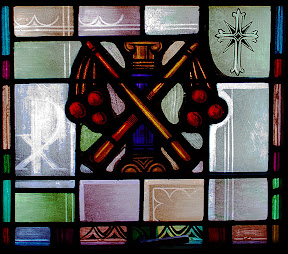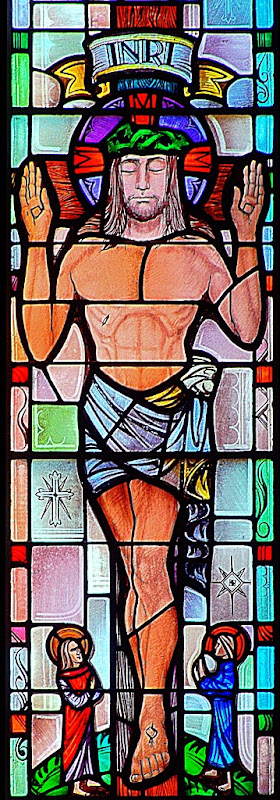 |
| From Zion Lutheran Church, Columbus, Ohio |
(Matthew 27:15-26)
Now it was the governor’s custom at the Feast to release a prisoner chosen by the crowd. At that time they had a notorious prisoner, called Barabbas. So when the crowd had gathered, Pilate asked them, “Which one do you want me to release to you: Barabbas, or Jesus who is called Christ?” For he knew it was out of envy that they had handed Jesus over to him.
While Pilate was sitting on the judge’s seat, his wife sent him this message: “Don’t have anything to do with that innocent man, for I have suffered a great deal today in a dream because of him.”
But the chief priests and the elders persuaded the crowd to ask for Barabbas and to have Jesus executed.
“Which of the two do you want me to release to you?” asked the governor.
“Barabbas,” they answered.
“What shall I do, then, with Jesus who is called Christ?” Pilate asked.
They all answered, “Crucify him!”
“Why? What crime has he committed?” asked Pilate.
But they shouted all the louder, “Crucify him!”
When Pilate saw that he was getting nowhere, but that instead an uproar was starting, he took water and washed his hands in front of the crowd. “I am innocent of this man’s blood,” he said. “It is your responsibility!”
All the people answered, “Let his blood be on us and on our children!”
Then he released Barabbas to them. But he had Jesus flogged, and handed him over to be crucified.
 |
That response was not sufficient because one need not know much history to make the spiritual connection between the modern Jewish religion and their roots in ancient Rabbinical Phariseeism. After further complaints Gibson compromised by removing the captions which read, “Let His blood be on us and on our children” though he left the Aramaic dialogue (for those who understand Aramaic.)
 |
| The Crucifixion of Jesus |
There is, however, one group of people around today who is willing to take responsibility for the death of Jesus: Christians.
Unlike modern Jews, Christians are not ashamed to say of Jesus, “Let his blood be on us and on our children!” and mean it in every sense of the phrase, including the sense that Jewish groups are so afraid of. The Holy Scriptures explain very well how we are responsible for the death of Jesus and how the blood of Jesus redeems us from our sins:
- “The blood of Jesus [God’s] Son cleanses us from all sin.” (1 John 1:7)
- “Do you not know that all of us who have been baptized into Christ Jesus were baptized into his death? … If we have been united with him like this in his death, we will certainly also be united with him in his resurrection.”(Romans 6: 3, 5)
- “Who are these, clothed in white robes, and from where have they come? … These are the ones coming out of the great tribulation. They have washed their robes and made them white in the blood of the Lamb.” (Revelation 7:13-14)
 |
 |
| Jesus prayed, “My Father, if it is possible, may this cup be taken from me. Yet not as I will, but as you will.” (Matthew 26:39) |
This is not to say that we are guiltless. We are all guilty. Our sin makes us enemies of God, and by our very nature we all wish to kill God and put ourselves in His place of power and authority. This is what we do whenever we commit actual sins. When we sin we are exerting our own sinful will against God and trying to push Him out of the way. God knows this very well. In fact, this is the very reason God became incarnate in Jesus Christ in the first place. God knew how hopeless our sinful situation was from before the beginning, so He decided to take care of our salvation Himself and that is just what Jesus did in His life and in His death. This is why Christians are not afraid to both confess our guilt in the death of Jesus, and also to confess our faith that because of His death and resurrection from the dead Jesus has forgiven us all our sins and will give eternal life to all who trust in Him.
***
Note: Although I used Mel Gibson’s movie and the surrounding objections as an illustration for this essay I am not unaware of the subsequent accusations of bad behavior on the part of Mr. Gibson. Whether Mel Gibson is anti-Semitic or not is irrelevant to this issue. The scene in question from the “Passion” movie is an accurate representation of the Gospel account from Matthew and neither the scene nor the Gospel of Matthew is anti-Semitic. Even if it turns out to be true that Mel Gibson has sinful feelings against Jews it does not come out in “The Passion of the Christ.” This is proven by the symbolism of Gibson’s cameo appearance in the movie. When Jesus is shown being nailed to the cross it is Mel Gibson’s hands which pound the nails into the hands of the Jesus character. This was Gibson’s way of saying (along with all Christians) “I am responsible for the death of Jesus. My sins caused the death of Jesus, but His death redeemed me of all my sins.”
For further reading: Matthew 27:15-26; 1 Corinthians 10:14-17; 1 Corinthians 11:23-26; Revelation 7:13-17; Romans 6:1-10; Hebrews 9:11-28; 1 John 1:5-10.
See also my 2004 newsletter article, “The Passion of Christ”

